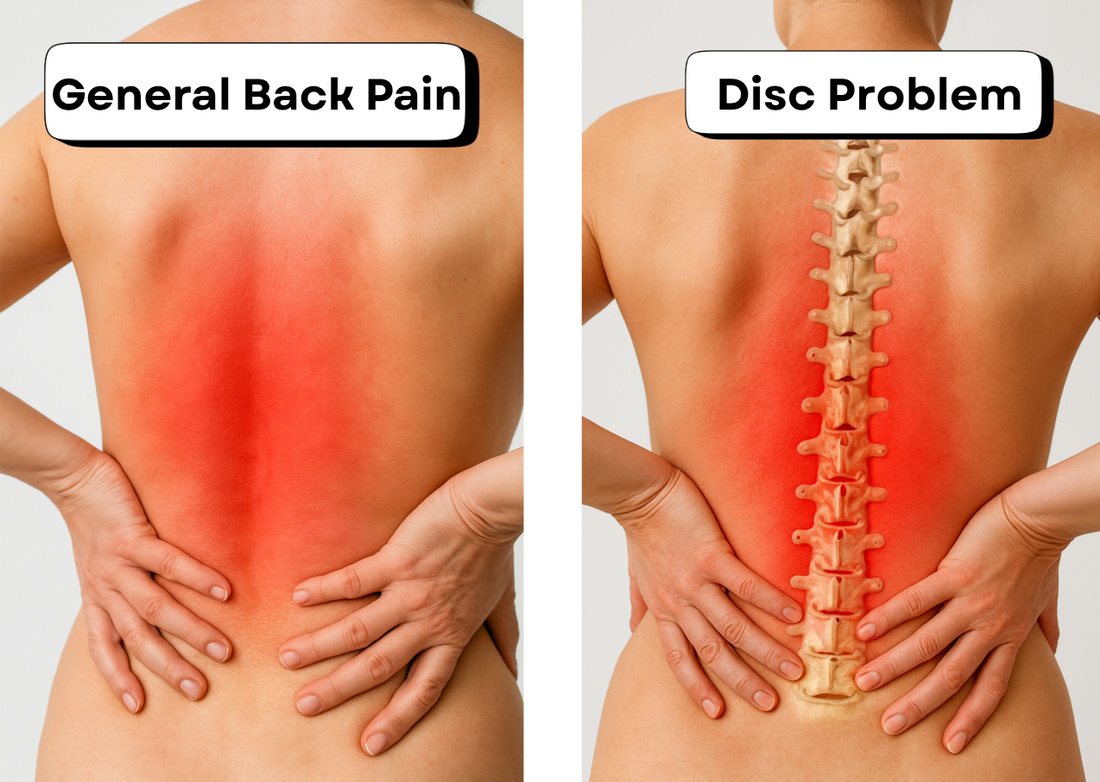
Back Pain vs Slipped Disc: How to Tell the Difference
Share
Back pain is one of the most common health complaints worldwide. However, not all back pain is the same. While general back pain may result from muscle strain, poor posture, or lifestyle factors, a slipped disc involves structural changes in the spine that can compress nerves and cause more severe symptoms. Understanding the differences between the two can help with early diagnosis and effective treatment.
Feature |
General Back Pain |
Slipped Disc (Herniated Disc) |
|---|---|---|
| Definition | Pain in the back caused by muscle strain, ligament sprain, poor posture, or lifestyle issues. | A condition where the soft inner portion of a spinal disc pushes through the outer layer, compressing nearby nerves. |
| Cause | Muscle overuse, poor posture, lifting heavy objects, stress, or sedentary lifestyle. Muscle overuse, nutrient deficiencies (like magnesium or vitamin D). | Injury, sudden strain, or age-related wear and tear Age-related degeneration, weak connective tissue, injury, or lack of joint/nervous system support nutrients (like collagen or B vitamins). |
| Nature of Pain | Dull, aching, or throbbing pain that may come and go. | Sharp, shooting, or burning pain, often radiating to other areas (e.g., legs). |
| Location | Usually localized to the back, sometimes spreading slightly to nearby muscles ,like neck. | Often radiates along the path of the nerve (sciatica), commonly affecting lower back, buttocks, and legs. |
| Movement Impact | Pain may worsen with physical activity but often improves with rest. | Pain can increase with movement, coughing, or sneezing due to nerve compression. |
| Nerve Symptoms | Rarely involves nerve-related symptoms. | Commonly causes numbness, tingling, weakness, or "pins and needles" in arms or legs. |
| Severity | Usually mild to moderate; manageable with rest, lifestyle changes, or over-the-counter medication. | Can be severe and disabling; may require medical intervention, physiotherapy, or surgery. |
| Diagnosis | Based on physical examination and medical history. Imaging is rarely needed. | Requires imaging (MRI, CT scan) to confirm disc herniation and nerve involvement. |
| Treatment | Rest, posture correction, exercise, heat/cold therapy, Supplements, pain relievers. | Medication, Supplements physiotherapy, steroid injections, or surgery in severe cases. |
| Recovery | Often resolves within days to weeks with proper care. | Recovery depends on severity; mild cases may heal with conservative care, while severe cases take longer. |
Practical Tips for Prevention
While not all back pain or slipped disc cases can be avoided, you can significantly reduce your risk with the right lifestyle choices and nutritional support:
✅ Conclusion:
Back pain and slipped discs, though both involving the spine, are distinct in their causes, symptoms, and severity. General back pain typically arises from muscle strain, poor posture, or lifestyle factors and is usually temporary and manageable with rest, exercise, and supportive measures. In contrast, a slipped disc involves structural changes in the spine that can compress nerves, leading to sharper pain, nerve symptoms, and potentially long-term disability if untreated. Understanding these differences, adopting preventive strategies like proper posture, core strengthening, and nutritional support, and seeking timely medical care when necessary are essential for maintaining spinal health and improving quality of life.


